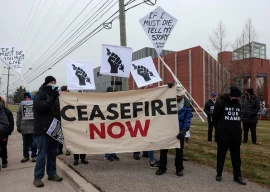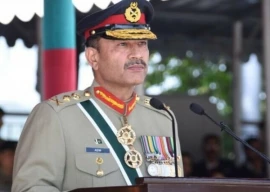
Iraq has been hit by weeks of political turmoil surrounding Prime Minister Haider al-Abadi's efforts to change the government.
Both Washington and the United Nations have warned the crisis could distract from the fight against the Islamic State (IS) group, which carries out frequent bombings against civilians.
Death toll in Iraq football pitch carnage at 32
The car bomb, which also wounded at least 38 people, struck a road in the Nahrawan area used by Shiite pilgrims who are walking to the shrine of Imam Musa Kadhim in northern Baghdad for annual commemorations, officials said.
IS claimed the attack and said it was carried out by a suicide bomber who detonated a vehicle laden with three tonnes of explosives.
IS considers Iraq's majority Shiites to be heretics.
Kadhim, the seventh of 12 imams revered in Shiite Islam, died in 799 AD. The pilgrimage has in recent years turned into a huge event that brings the Iraqi capital to a standstill for days.
IS overran large areas north and west of Baghdad in 2014, but Iraqi forces backed by US-led military assistance have since regained signficant ground.
The jihadists still control a large part of western Iraq, and are able to carry out frequent attacks against both civilians and security forces in government-held areas.
Last year's pilgrimage was also marred by attacks against worshippers that killed at least 13 people.
And four more were burned or shot to death when mobs torched houses and a Sunni religious endowment building after rumours of a suicide bomber sparked panic among a crowd of pilgrims.
The Saturday bombing came as hundreds of people turned out in Baghdad for a demonstration aimed at pressuring the government to carry out reforms, the latest in a series of such protests in the capital.
Demonstrators gathered at Baghdad's Tahrir Square and near the heavily-fortified Green Zone, where the government is headquartered.
"We are sending a message to parliament that today is the last chance" to accept "complete governmental change," said Hassanain Ali, one of the demonstrators.
Abadi has called for the current government of party-affiliated ministers to be replaced with technocrats, a move opposed by powerful political parties that rely on control of ministries for patronage and funds.
Key government posts have for years been shared out based on political and sectarian quotas, a practice demonstrators want to end.
Parliament has repeatedly been hit by chaos related to efforts to change the cabinet in recent weeks, with MPs holding an overnight sit-in at parliament, brawling in the chamber and seeking to sack speaker Salim al-Juburi before electing an interim replacement who has chaired his own rival sessions.
Suicide car bomb kills 29 south of Baghdad
Lawmakers approved some of Abadi's nominees for the new cabinet on Tuesday, but MPs who opposed Juburi and sought to disrupt the session were barred from attending, raising questions about its legality.
Iraqi MPs were due to meet Saturday for a vote on additional candidates, but failed to reach a quorum for a morning session, leading Juburi to call for another in the afternoon.









1736939933-0/sidra--(8)1736939933-0-270x192.webp)

1732012115-0/Untitled-design-(14)1732012115-0-270x192.webp)
1736844405-0/Express-Tribune-(2)1736844405-0-270x192.webp)










COMMENTS
Comments are moderated and generally will be posted if they are on-topic and not abusive.
For more information, please see our Comments FAQ